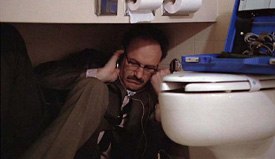THE CONVERSATION is a film that I have seen twice. I wasn't all that impressed with it the first time I saw it, but considering its reputation I decided to give it a second viewing. For whatever reason sometimes certain films don't hit you the first time, but then startle you the second time around. This is the same experience I had with DR. STRANGELOVE (now one of my favorite films) and David Gordon Green's GEORGE WASHINGTON. I believe the pacing of Francis Ford Coppola's thriller is part of why this happened. I think upon my first viewing, I was beguiled by the slow build and missed the point of the ending. Upon seeing it again, I was beguiled by the unique anti-hero unlike any seen elsewhere on screen and an ending that blew me away with its depth and style.
Harry Caul (Gene Hackman, HOOSIERS) is the preeminent surveillance man in the U.S. He's a guilt-ridden, paranoid Catholic, who is severely guarded about his personal life. Along with his partner Stan (John Cazale, GODFATHER), he's working a new case where he has to record the conservation of Ann (Cindy Williams, TV's LAVERNE & SHIRLEY) and Mark (Frederic Forrest, POINT BLANK), who are meeting in a noisy park during lunch hour. Caul obsesses about one garbled comment by Mark, and when he uncovers it, floods of bad memories rush back to him. He starts to question the motives of his clients the director of a major company (Robert Duvall, APOCALYPSE NOW) and the exec's assistant Martin Stett (Harrison Ford, STAR WARS). In a dream, we see Caul tell Ann that he isn't scared of death, only murder.
Though this is a thriller, it's also an intricate character study, as well. Harry Caul is such a unique character, because he serves the purpose of the "hero," wanting to do right, but in reality he's a mess. He takes great pride in his work, but struggles with the possibilities that it leads to the harm of others. His successful jobs have made him a bit of a legend within the surveillance community, which he takes great quiet pride in, but we see over and over again that he is easily fooled, especially when his emotions get involved, which only makes him increasingly more paranoid and insecure. His secret lover Amy (Teri Garr, TOOTSIE) knows when he's sneaking into her apartment because of the way he tries to be so quiet. Bernie Moran, his chief competitor, desperately wants to figure out his secrets and then plays him for a sap. When he opens up a little to the hooker Meredith (Elizabeth MacRae, TV's GOMER PYLE), he gets played for a sucker again.
The ending is complex, dealing with guilt and personal responsibility. Caul has been trying to use high-tech technology to observe life from a distance, but it never fails to invade his wall of privacy. A fateful rendezvous will throw everything Caul, and the audience, thought was real into disarray. We learn that it's the nuance and context of a statement that reveals the truth. Part of what makes the conclusion so great is the nuance — is it real or just an increased form of Caul's paranoia? The answer to that question is context. What is the film about coming out right after Watergate and toward the tail end of Vietnam when America was suffering from the guilt of a pointless war that made many question their own personal responsibility in the matter?








